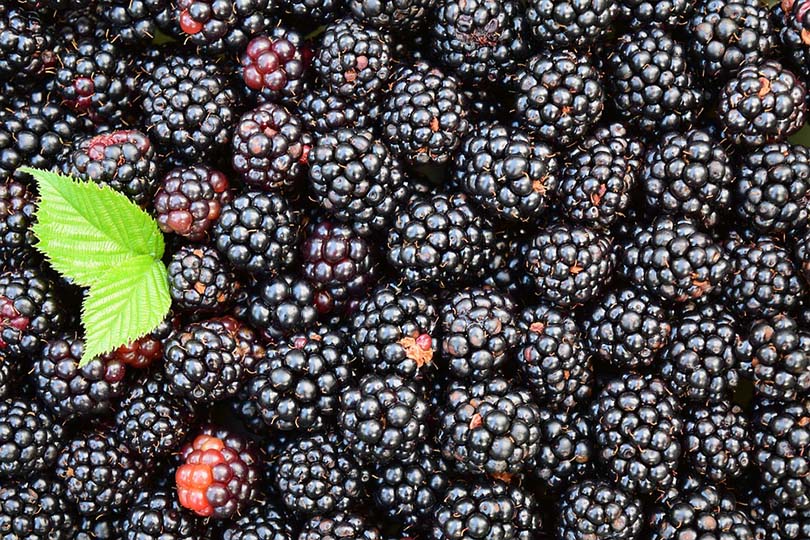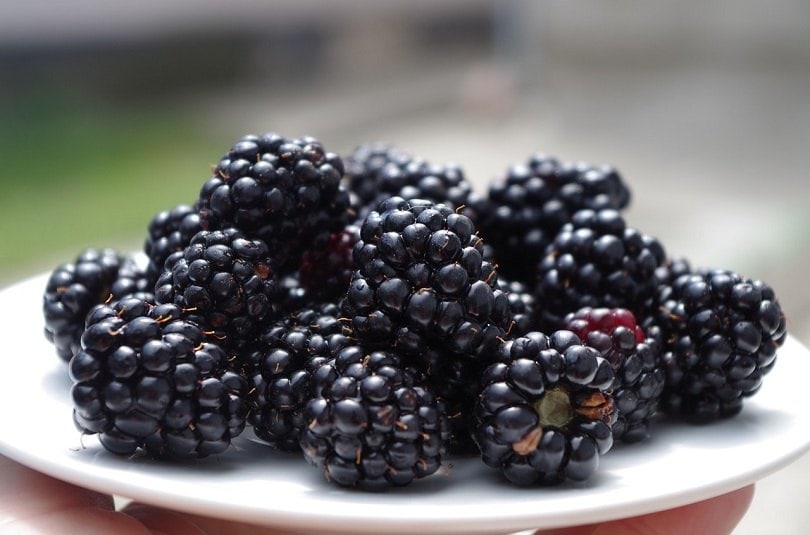Click to Skip Ahead
As man’s best friend and a curious taster, your dog will likely join you foraging for blackberries in the forest, or welcome you home from the grocery store after buying a carton full of berries with equal gusto. They want to be where we are, and often beg for the things we eat. While it’s a well-known fact that some foods aren’t safe for dogs, such as chocolate, other foods fall into more of a gray area.
Thankfully, blackberries are safe for dogs, and even healthy in moderation, as a good source of antioxidants and several key vitamins. However, blackberries should only be given as treats, not as their primary source of nutrition. Because blackberries are high in fiber and actually contain low amounts of naturally occurring xylitol, you should limit their daily portion to no more than a handful depending on their size to be safe.
Are Blackberries Safe for Dogs?

Yes, blackberries are safe for your canine to eat. While we don’t usually recommend letting your dog eat from bushes since many plants are toxic, wild blackberries are a safe snack with no poisonous impostors, so you can go ahead and let them graze if you’re on a walk in the woods.
Keep in mind that while blackberries are considered safe for your dog to eat, they can still harm them in excess. Too many blackberries can cause diarrhea and other GI issues since they’re packed full of fiber. Blackberries also contain naturally occurring xylitol.1 Even though xylitol is found in the wild, this sugar alcohol is typically manufactured as an artificial sweetener because natural food sources such as blackberries aren’t potent enough to be used as a sugar substitute. Xylitol is toxic to dogs. When xylitol is used as a sweetener, just a small amount can potentially kill a dog since it’s super concentrated. However, as mentioned, the low, naturally-occurring amount in blackberries shouldn’t pose a problem unless your dog accidentally eats a ton.
If you buy blackberries from the grocery store or farmer’s market, you should also make sure that they’re organic, and rinse them thoroughly before feeding them to your dog to reduce the risk of exposing your pet to pesticides.
Are Blackberries Healthy for Dogs?
Often touted as a “super food,” blackberries are a great source of antioxidants, which help reduce inflammation. They’re also full of fiber and vitamins A, B, C, E, and K. Fiber is a crucial part of your dog’s diet that helps regulate their dog’s digestive system. The wide variety of vitamins are essential to many different processes in your dog’s body, including their bones, skin, eyes, and immunity.
Of course, your dog won’t benefit from eating blackberries as much as humans would since they eat a smaller amount. As a treat, though, blackberries score better than many commercial dog treats that are high in calories, fat, and preservatives. Plus, when compared to other fruits, blackberries only have a modest amount of sugar, which is good news for our canine friends.

How Many Blackberries Should I Feed My Dog?
Treats such as blackberries shouldn’t comprise more than 10% of your dog’s overall diet. That percentage is a little tricky to gauge in practice, but basically, it means that 90% of your dog’s daily nutrients should come from their food.
The exact portion of blackberries that your dog can have in a day also depends on their size. For example, a Shih Tzu eats considerably less food than a Great Dane, so they would be able to eat fewer blackberries. Here’s a chart from PetMD to help you find a serving size suitable for your dog:
- Extra-small dogs (2–20 pounds) = 1–2 blackberries
- Small dogs (21–30 pounds) = 2–3 blackberries
- Medium dogs (31–50 pounds) = 3–5 blackberries
- Large dogs (51–90 pounds) = 5–6 blackberries
- Extra-large dogs (91+ pounds) = small handful of blackberries
Up to a handful of blackberries are generally considered safe for your dog, but if you have a tiny dog, they should only have a couple.

Can Dogs Eat Blackberry Jam or Fruit Desserts?
A blackberry cobbler in the oven may waft tantalizing smells to your dog’s nose, but unfortunately the sugar and high fat content make this summer treat a no-go for Fido. Sugar isn’t toxic to dogs, but it increases their risk of obesity and diabetes. Plus, there aren’t any known health reasons for giving sugar to dogs, so it’s best to avoid it entirely.
Blackberry jam falls under the same category as blackberry cobbler or pie since it’s laden with sugar. Even so, a tiny taste of jam or a fruit dessert won’t hurt your dog unless it contains a toxic ingredient, such as xylitol. If your pup can safely digest dairy, serving a couple blackberries topped with whipped cream works as a better substitute for sweets.
Final Thoughts
High in nutrients and low in sugar, blackberries are a safe summer snack for your dog in moderation. Giving your dog too many blackberries can result in unpleasant results such as tummy issues and put them at a slight risk of xylitol poisoning if too many are consumed. So never give them more than a handful, and even fewer if you have a small dog.
See Also:
Featured Image Credit: FruitnMore, Pixabay










